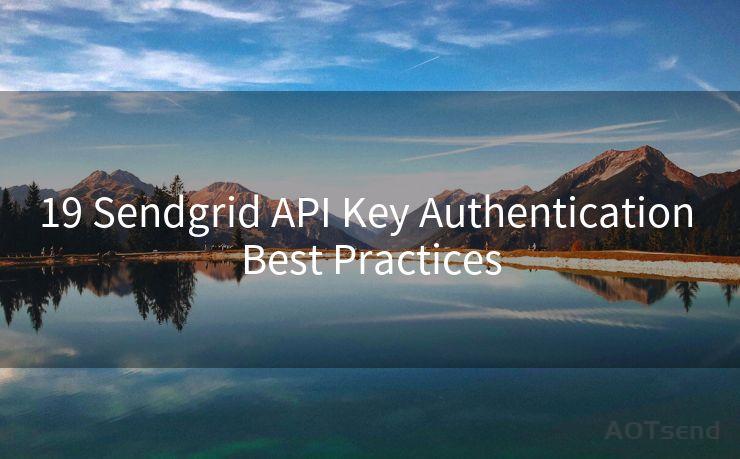19 Sendgrid API Key Authentication Best Practices




When integrating with SendGrid, one of the most crucial aspects is ensuring secure authentication through API keys. Here are 19 best practices for SendGrid API key authentication to guarantee optimal security.
1. Understanding API Keys
API keys are unique identifiers that allow access to SendGrid's services. They act as a secure way to authenticate and authorize API requests, replacing traditional username and password combinations.
2. Creating Strong API Keys
When generating API keys in SendGrid, make sure to create strong and unique keys. Avoid using easily guessable or common patterns.
3. Limiting Access
It's essential to limit the access of each API key to the minimum necessary permissions. This ensures that if a key is compromised, the potential damage is minimized.
4. Regular Rotation
Regularly rotating API keys reduces the risk of unauthorized access. Set a schedule for key rotation and stick to it.
5. Secure Storage
Never hardcode API keys into your application or store them in plain text. Use secure storage solutions like environment variables or encrypted configuration files.
6. Monitoring and Logging
Enable detailed logging and monitoring for all API requests. This helps identify any unauthorized or suspicious activity quickly.
7. IP Whitelisting
If possible, whitelist specific IP addresses that can use the API keys. This adds another layer of security by restricting access to trusted sources.
8. HTTPS for All Requests
Always use HTTPS for API requests to ensure data integrity and confidentiality. SendGrid supports HTTPS by default.
9. Avoiding Sharing Keys
Never share your API keys with anyone, especially via unsecured channels like email or chat.
10. Two-Factor Authentication
Consider enabling two-factor authentication for your SendGrid account. This adds an extra layer of protection even if your credentials are compromised.
11. Keeping Up to Date
Stay updated with the latest security patches and updates from SendGrid. This ensures your API keys are protected against known vulnerabilities.
12. Reviewing Permissions Regularly
Periodically review the permissions assigned to each API key. As your application evolves, some permissions may become unnecessary.
13. Using Separate Keys for Separate Functions
Create separate API keys for different functions or services. This helps isolate potential risks and makes it easier to revoke access if needed.
14. Implementing Rate Limiting
Consider implementing rate limiting on your API requests to prevent abuse or denial-of-service attacks.
15. Avoiding Leaked Keys
Be cautious when sharing code or configurations that might contain API keys. Use .gitignore or similar mechanisms to prevent accidental leaks.
16. Responding to Breaches
Have a plan in place to respond quickly if an API key is compromised. This includes revoking the key, assessing the damage, and notifying relevant parties.
17. Educating Developers
🔔🔔🔔
【AOTsend Email API】:AOTsend is a Managed Email Service for sending transactional emails. Support Email Types: reminders, authentication, confirmations, notifications, verification codes, invoices, password resets, account activations, billing statements, two-factor authentication (2FA), and one-time passwords (OTP) emails, etc. $0.28 per 1000 Emails. 99% Delivery, 98% Inbox Rate.
You might be interested in:
Why did we start the AOTsend project, Brand Story?
What is a Managed Email API, How it Works?
Best 25+ Email Marketing Platforms (Authority,Keywords&Traffic Comparison)
Best 24+ Email Marketing Service (Price, Pros&Cons Comparison)
Email APIs vs SMTP: How they Works, Any Difference?
Ensure your team understands the importance of secure API key management. Provide training and resources to reinforce best practices.
18. Auditing and Compliance
Regularly audit your API key usage to ensure compliance with internal policies and external regulations.

19. Staying Vigilant
Security is an ongoing process. Stay vigilant and proactive in protecting your API keys and SendGrid account.
By following these best practices, you can significantly reduce the risks associated with SendGrid API key authentication. Remember, security is everyone's responsibility, so make sure your team is well-versed in these guidelines.




Scan the QR code to access on your mobile device.
Copyright notice: This article is published by AotSend. Reproduction requires attribution.
Article Link:https://www.mailwot.com/p4892.html



